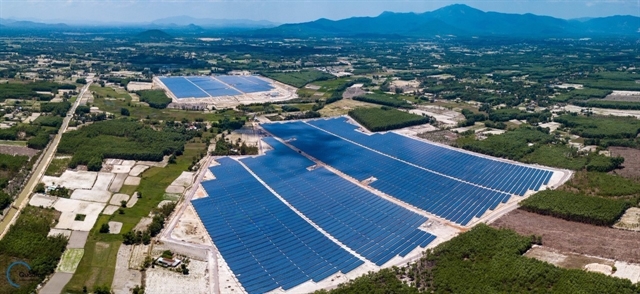 Politics & Law
Politics & Law


|
| Cát Hiệp solar power plant in the south-central province of Bình Định. Việt Nam expects to promote renewable energy development to reduce carbon emission. — VNA/VNS Photo |
HÀ NỘI — Việt Nam has completed an updated Nationally Determined Contribution (NDC) with plans to reduce total greenhouse gas emissions 9 per cent by 2030 in an attempt to respond to climate change.
Tăng Thế Cường, director of the Ministry of Natural Resources and Environment’s Department of Climate Change, said Việt Nam had completed the updated NDC despite complications caused by the COVID-19 pandemic after five years of efforts to implement its international commitments in response to climate change.
Under the updated version, the country has decided to reduce its total greenhouse gas emissions by 9 per cent by 2030, and continue to reduce them up to 27 per cent if it receives international support through bilateral and multilateral co-operation, and the Paris Agreement mechanisms on climate change.
The new version has been submitted to the Secretariat of the United Nations Framework Convention on Climate Change (UNFCCC).
Cường said the Paris Agreement on climate change was adopted at the 21st Conference of the Parties to the United Nations Framework Convention on Climate Change (COP21).
This is the first global legal framework binding the responsibilities of all Parties in climate change mitigation and adaptation in the context of sustainable development.
All participating Parties, therefore, were required to contribute to mitigation, adaptation, finance, technology transfer and capacity building to implement the NDC as a way of responding to global climate change, he said.
Việt Nam's first NDC was submitted in September 2015. At that time, Việt Nam’s NDC, like those of other countries, was categorised as an Intended Nationally Determined Contribution (INDC).
The Ministry of Natural Resources and Environment has since co-ordinated with relevant ministries, sectors and agencies to review and update the NDC in the context of national development.
Cường said compared to the original NDC, the contribution to mitigation in the updated NDC had significantly increased in terms of both emissions reduction volume and reduction percentage with Việt Nam’s domestic resources.
Emissions reductions have increased by 21.2 million tCO2eq (from 62.7 million tCO2eq to 83.9 million tCO2eq), equal to an increase of emission reduction of 1 per cent (from 8 per cent to 9 per cent).
The contributions of greenhouse gas emissions reduction with additional international assistance will increase from 25 per cent to 27 per cent and greenhouse gas emissions reductions will increase by 52.6 million tCO2eq (from 198.2 million tCO2eq to 250.8 million tCO2eq).
Given the socio-economic situation of a developing country significantly affected by climate change, the updated NDC shows the country's highest efforts to contribute to global climate change response.
The country's efforts are also reflected by the fact the Government considers responding to climate change vital. It is the responsibility of the entire country to simultaneously conduct climate change adaptation and mitigation actions, and use natural resources efficiently and sustainably.
In reply to Việt Nam’s efforts and completion of the updated NDC, the UNFCCC Secretariat and the NDC Partner Organisation recently sent letters to the Minister of Natural Resources and Environment, appreciating Việt Nam's efforts to respond to climate change.
Minister Trần Hồng Hà affirmed the goal of sustainable development, including developing a low-carbon economy and moving towards a circular economy, had become a key national policy.
Low-carbon development to be resilient to climate change has been institutionalized in the revised Law on Environmental Protection, which will be submitted to the National Assembly for approval this year.
“In the coming time, Việt Nam will make more efforts to implement specific strategies and action plans such as reducing the use of fossil fuels and promoting the development of renewable energy, green financial development and carbon markets in the future.”
“These efforts will contribute to the implementation of the updated NDC from 2021,” he said. — VNS